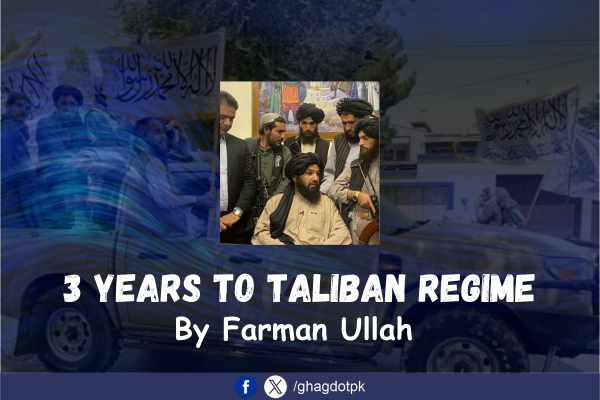By Farmanullah
August 15 marks the completion of three years since the regime change in Afghanistan. Afghanistan’s relationship with Pakistan remains strained despite shared borders and cultural ties. Pakistan is also concerned about the presence of anti-Pakistan militant groups, such as the TTP, in Afghanistan, which has affected security cooperation. Trade and economic ties have suffered due to border closures and tariff disputes. Diplomatic tensions persist. Pakistan has expressed concerns about the humanitarian situation in Afghanistan, particularly regarding women’s rights. Despite high-level visits and negotiations, the relationship remains challenging, influenced by historical, political, and security factors, hindering meaningful cooperation and stability in the region.
According to senior analysts who keep a close eye on the political, diplomatic, and trade landscape of Pakistan, particularly Khyber Pakhtunkhwa, the current government of Pakistan has made the mistake of considering the Taliban regime in its interest.
Syed Akhtar Ali Shah
The Former secretary to the government, home and tribal affairs and retired IGP says, “The government of Pakistan at that time made an effort by sending delegations of both official and unofficial members, including tribal elders. However, during this period, the Taliban gained significant strength and managed to reorganize and recruit new members. Whenever a state engages in negotiations or agreements, it implicitly recognizes the legitimacy of the other party. This is the moment when they emerge openly and organize themselves. In guerrilla warfare, safe havens are crucial, and they have reactivated theirs”
Mehmood Shah
Brigadier (Retd) Mehmood Shah, former secretary of Home and Tribal affairs expressed, “I believe they lack expertise in foreign policy. To put it simply, Afghanistan is heavily reliant on Pakistan, with over 50% dependence. All major routes, including those for religious pilgrimages, international travel, medical care, and trade, pass through Pakistan. While they share borders with other countries, their reliance on Pakistan is significantly higher, ranging from 50% to 60%.”
Aqeel Yousafzai
Mr Yousafzai is a journalist, author, analyst and supreme authority on Pak-Afghan affairs articulates
“The TTP’s commanders and fighters are 90% Pashtun, hailing from the former FATA regions of Khyber Pakhtunkhwa. As observers of these developments, we had expressed concerns that their alliance was not just tactical but also ideological and organizational. They had collaborated in the two-decade-long war against the US and NATO, and their connections even extended to global terrorist networks like Al-Qaeda. Our concerns were that Pakistan’s optimism about the situation would be short-lived, but we underestimated the extent of the Afghan Taliban’s support for the TTP and other anti-Pakistan groups.”
“It was later revealed that the Afghan Taliban had not only backed but also orchestrated the TTP’s proxy war against Pakistan. This led to a surge in attacks on security forces in Balochistan and Khyber Pakhtunkhwa, exposing the depth of their support and the provision of weapons by international proxies. The aftermath saw a surge in attacks in Khyber Pakhtunkhwa, with the 2021 tally surpassing the combined total of the previous five years. The region witnessed 375 or 390 attacks, a staggering number that eclipsed the entirety of the Afghan war,” he added.






